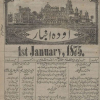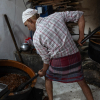Kahāṇīs or vrata-kathā are the stories associated with vratas (vows) which explain the rituals and purpose of practice through the use of characters in storytelling. The etymology of the word ‘Kahāṇī’ can be traced to the Prakrit word kahā or kahāṇio (story) or a Sanskrit word kathā (story). Kahāṇīs are always in the form of oral narration and are never meant to be read. It is very difficult to find out the origin of these stories since they were transmitted orally as a part of the tradition. No single authorship can be assigned to these stories. The stories also have a definite role in propagating the vow as a religious practice in society. To maintain a standard form of rituals, the rules were encoded and are reflected in stories. It might have been a continuous process during the Puranic period since the vows and related rituals are detailed in the scriptures such as Skanda Purāṇa, Padma Purāṇa, Bhaviśya Purāṇa, Vrathakhaṇḍa of Hemādri.[1]
Dr Sarojini Babar,[2] who has studied Marathi folklore, has mentioned the kahāṇīs as stories that are told by old ladies to train the young women in the family. This practice of narrating kahāṇīs is meant to pass on a particular religious practice to a new generation. Many of these kahāṇīs are composed on the basis of the Puranic stories. The language of the stories is simple and has short sentences. The interesting aspect of the kahāṇīs is that the stories are directly addressed to the deity and never addressed to the audience. From the detailed observation, it is noticed that the spread of these stories are limited to a specific economic group of society so that there are not many additions and spread. Hence, kahāṇīs have limited scope compared to other Maharashtrian folk stories (lokakathā).
Kahāṇīs of Gauri Vow
Due to geographical divisions, the Gaurī vow has two different type of worship prevalent in Maharashtra. In coastal Maharashtra, one goddess, namely, Jyeṣṭhā is in worship; while in the Deccan, two goddesses, Jyeṣṭhā and Kaniṣṭhā, are in worship. Due to this, two different stories of the Gaurī vow are prevalent in Maharashtra.
To understand the nature of stories and the difference in the narratives depending on geographical location, the kahāṇīs have been reproduced in this text. Kahāṇī 1 is the story prevalent in coastal Maharashtra where a brahmin is the central character of the story. Kahāṇī 2, prevalent in the Deccan part of Maharashtra, is the story of a king who has two wives. Kahāṇī 3 is a variation of kahāṇī 2. The combination of the ritual practices prevalent in coastal and Deccan Maharashtra is reflected in kahāṇī 4.
Kahāṇī 1:
आटपाट नगर होतं| तिथं एक गरीब ब्राह्मण राहत होता| पुढं एके दिवशी काय झालं? भाद्रपद महिना आला. घरोघर लोकांनी गौरी आणल्या| रस्त्योरस्तीं बायका दृष्टीस पडूं लागल्या. घंटा वाजूं लागल्या| हे त्या ब्राह्मणाच्या मुलांनी पाहिलं| मुलं घरी आली आईला सांगितलं, आई आई, आपल्या घरीं गौर आण| आई म्हणाली, बाळांनो गौर आणून काय करूं? तिची पूजापत्री केली पाहिजे, घावनघाटल्याचा नैवेद्य दाखवला पाहिजे आणि आपल्या घरांत तर कांहीं नाही| तुम्ही बापाजवळ जा, बाजारातलं सामान आणायला सांगा. सामान आणलं म्हणजे गौर आणीन| मुलं तिथून उठली| बापाकडे आली| बाबा बाबा, बाजारांत जा| घावनघाटल्याचं सामान आणा, म्हणजे आई गौर आणील| बापानं घरात चौकशी केली| मुलांचा नाद ऐकला| मनांत फार दु:खी झाला| सोन्यासारखी मुलं आहेत, पण त्यांचा हट्ट पुरवत नाही. गरिबीपुढं उपाय नाही| मागायला जावं तर मिळत नाही| त्यापेक्षा मरणं बर| म्हणून उठला| देवाचा धांवा केला| तळ्याच्या पाळी गेला| जीव द्यावा म्हणून निश्चय केला, अर्ध्या वाटेवर गेला| इतक्यांत संध्याकाळ झाली| जवळच एक म्हातारी सवाशीण भेटली| तिनं ह्याची चाहूल ऐकली| कोण म्हणून विचारलं| ब्राह्मणानं हकीकत सांगितली| म्हातारीनं समाधान केलं| बोधाच्या चार गोष्टी सांगितल्या. ब्राह्मणानं म्हातारीला घरीं आणलं. बायकोनं दिवा लावला| चौकशी केली| पाहुण्या बाई कोण आणल्या म्हणून विचारलं| नव-यानं सांगितलं. बायको घरात गेली आणि आंबिलीकरतां कण्या पाहूं लागली| तों मडक आपलं कण्यांनी भरलेलं दृष्टीस पडलं| तिला मोठं नवल वाटलं| ही गोष्ट तिनं आपल्या नव-याला सांगितली| त्याला मोठा आनंद झाला| पुढं पुष्कळ पेज केली| सगळ्यांनी पोटभर खाल्ली| सगळींजणं आनंदानं निजलीं| सकाळ झाली, तशी म्हातारीनं ब्राह्मणाला हांक मारली, मुला मुला, मला न्हाऊं घालायला सांग म्हणून म्हणाली| घावन घाटलं देवाला कर. नाहीं काहीं म्हणूं नको| रड कांहीं गाऊं नको. ब्राह्मण तसाच उठला| घरांत गेला| बायकोला हाक मारली| अग अग, ऐकलसं का? आजीबाईला न्हाऊं घाल असं सांगितलं| आपण उठून भिक्षेला गेला| भिक्षा पुष्कळ मिळाली| सपाटून गुळ मिळाला| सगळं सामान आणलं ब्राह्मणाला आनंद झाला| बायकोनं सर्व स्वयंपाक केला| मुलांबाळांसुद्धां पोटभर जेवली| म्हातारीनं ब्राह्मणाला हांक मारली| उद्यां जेवायला खीर कर म्हणून सांगितल| ब्राह्मण म्हणाला, आजी आजी, दूध कोठून आणू? तशी म्हातारी म्हणाली, तूं कांहीं काळजी करूं नको| आतां ऊठ आणि तुला जितक्या गाई, म्हशी पाहिजे असतील तितके खुंट पुर| तितक्यांना दावी बांध| संध्याकाळी गोरज मुहूर्तावर गाई-म्हशींची नांव घेऊन हांका मार, म्हणजे त्या येतील| तुझा गोठा भरेल| त्यांचं दूध काढ| ब्राह्मणांनं तसं केलं| गाई-म्हशींना हांका मारल्या| त्या वासरासुद्धां आल्या| ब्राह्मणानं त्यांचं दूध काढलं दुस-या दिवशीं खीर केली| संध्याकाळ झाली तशी म्हातारी म्हणाली, मुला मुला, मला आता पोंचती कर. ब्राह्मण म्हणू लागला, आजी आजी, तुमच्या कृपेनें मला सगळं प्राप्त झालं| आतां तुम्हाला पोंचत्या कशा करूं| तुम्ही गेलां म्हणजे हें सर्व नाहींसें होईल| म्हातारी म्हणाली, तूं कांहीं घाबरूं नको| माझ्या आशीर्वादानं तुला कांहीं कमी पडणार नाहीं| ज्येष्ठागौर म्हणतात ती मीच| मला आज पोंचती कर. ब्राह्मण म्हणाला, हें दिलेलं असंच वाढावं असा कांहीं उपाय सांग| गौरीनं सांगितलं, तुला येताना वाळू देईन ती सा-या घरभर टाक| हांड्यावर टाक, मडक्यांवर टाक, पेटींत टाक, गोठ्यांत टाक, असं केलं म्हणजे कधीं कमीं होणार नाहीं| ब्राह्मणानं बरं म्हटलं| तिची पूजा केली| गौर आपली प्रसन्न झाली, तिनं आपलं व्रत सांगितलं| भादव्याच्या महिन्यांत तळ्याच्या पाळीं जावं| दोन खडे घरीं आणावे| ऊन पाण्यानं धुवावे, ज्येष्ठा गौर व कनिष्ठा गौर म्हणून त्यांची स्थापना करावी| त्यांची पूजा करावी| दुसरे दिवशी घावनगोडं, तिसरे दिवशी खीर पोळीचा नैवेद्य दाखवावा. सवाष्णीची ओटी भरावी| जेवू घालावं. संध्याकाळीं हळदकुंकू वाहून बोळवण करावी म्हणजे त्याला अक्षय सुख मिळेल| संतत, संपत मिळेल| ही साठां उत्तरांची कहाणी पांचां उत्तरीं देवाच्या दारीं, गाईच्या गोठीं, पिंपळाच्या पारीं सुफळ संपूर्ण|
There was a city named Aṭapāṭa. In that city, there lived a poor brāhmaṇa with his wife and children. It was the Bhādrapada month, the time of Gaurī vow and the whole village was in a celebratory mood. A cheerful crowd of women was in the street. Houses were decorated for the festival. The festive environment allured the children of the brāhmaṇa. They went home and told their mother, ‘Mother, let’s bring Gaurī to our home.’ The mother told them to ask their father. The brāhmaṇa heard the conversation and was saddened by his helplessness, his poverty, which stopped him from celebrating the Gaurī vow. On that evening, he decided to commit suicide and went to the banks of the river to do so.
On the bank of the river, he met an old married woman sitting under a tree. She consoled and advised him to be strong. He took her home. His wife received her respectfully but was worried about the dinner. However, to her delight, she found her storage vessels full of grains. That night she cooked rice porridge and, for the first time, everyone slept with a full stomach. The next day, the old woman told the wife of the brāhmaṇa, ‘give me a bath and make me ready. I also wish to eat ghāvana ghāṭala (a type of food offered to Gaurī in coastal Maharashtra).’ The brāhmaṇa asked his wife to bathe the old woman and went out to beg for alms. That day, fortunately, he had a good collection to make ghāvana ghāṭala. The wish of the old woman was fulfilled and everybody again had a full meal. On the third day, the old woman wanted to have kheer/payasam, but the brāhmaṇa told her they don't have milk. The old woman told him to make pegs in the courtyard and asked him to call as many cows as he wants. He did so. Cows came one by one with their calves and he got plenty of milk. His wife made kheer and old woman became very happy.
In the evening, she asked him to take her back home. But the brāhmaṇa was reluctant and he told her, ‘because of you I got all these blessings and prosperity, so how can I leave you.’ Then the old woman revealed that she is Jyeṣṭhā Gaurī. She told him the secret of the Gaurī vow and the rituals associated with it. She advised, ‘In the month of Bhādrapada, one should bring pebbles from the bank of the river and should worship those as an illustration of Jyeshtha Gauri. On the second day, ghāvana ghāṭala; and on the third day, kheer should be offered as the naivedyam to her. On the evening of the third day, those pebbles should be immersed in the water.’ Finally, she told him to leave her on the banks of the river and take some sand from the river as a token of prosperity. Thereafter, the brāhmaṇa and his family lived happily.
Kahāṇī 2:
आटपाट नगर होतं| तिथे एक राजा राज्य करीत होता| त्याला दोन राण्या होत्या| एक दिवस आवडती राजाला म्हणाली, ‘एक तर नावडती इथं राहील किंवा मी राहील’| राजानं तिचं ऐकून नावडतीला राज्याच्या बाहेर घर बांधून दिलं| नावडती आपल्या लेकासह तिथे राहू लागली| राजा तिला रोज फक्त पायलीभर जोंधळे अन् तांब्याभर ताक पाठवीत असे| त्या गावात एक तळं होतं| सगळा गाव तिथंच पाणी भरे| राजाच्या काहारणीसुद्धा तिथूनच पाणी नेत| एकदा काय झालं की, भाद्रपदाचा महिना आला| तळ्यावर एक दिवस दोन म्हाता-या येऊन बसल्या| बायकांना विचारू लागल्या, ‘राजाच्या काहारणी कशा ओळखाव्या’? बायका म्हणाल्या, ‘मोत्यांच्या चुंबळी व चांदीच्या घागरीवरून ओळखाव्या’. थोडा वेळाने काहारणी आल्या| म्हाता-यांनी विचारलं, ‘तुम्ही कोणाच्या काहारणी?’ ‘आम्ही आवडतीच्या!’ तशा म्हाता-या म्हणाल्या, तुमच्या राणीला जाऊन सांगा तिच्या मावशा आल्या आहेत व तळ्याकाठी बसल्या आहेत|’ काहारणी वाड्यात गेल्या| राणीला सांगितल, तशी राणी म्हणाली, ‘माझ्या कोणी मावश्या नाहीत|’ काहारणी म्हणाल्या, ‘आपण एकदा त्यांना बघावं म्हणजे आपल्या लक्षात येईल|’ राणीने त्यांना घेऊन येण्याचा हुकूम केला| म्हाता-या आल्यावर राणीनं त्यांना एक सतरंजी घालून दिली| बसायला सांगितलं व आपण नुसतीच इकडून तिकडे मिरवत होती| आहारा वाट पाह्यली, पहारा वाट पाह्यली, म्हाता-यांशी कोणीच बोलेना| एका म्हातारीला खोकला आला| तशी राणी वसकून धावली, ‘म्हातारे! बाहेर जाऊन थुंक| इथं घाण करू नको,’ म्हातारी बरं म्हणून बाहेर गेली| थोड्या वेळानं म्हाता-या राणीला म्हणाल्या, ‘आम्ही जातो|’ राणीनं ‘बरं जा’ म्हटलं| म्हाता-या तिथून उठल्या| पुन्हा तळ्यावर जाऊन बसल्या| दुस-या दिवशी तिथे नावडतीची काहारीण आली| म्हातारीनं विचारलं, ‘कोणाची काहारीण? नावडतीची?’ ‘तुम्ही कोण?’ ‘आम्ही तुझ्या राणीच्या मावश्या| राणीला जाऊन सांग’ ‘काहारणी म्हणाली, ‘बापा! इथं काऊन बसल्या? चाला घरी|’ ‘राणी रागावेल तर?’ ‘तुमी भाचीला ओळखत नाही| कारण राणी कधीच रागवत नाही|’ काहारणी म्हाता-यांना घेऊन घरी आल्या| मावश्या आल्या म्हणून आवाज दिला| राणी उठून बाहेर आली| म्हाता-यांना मिठी मारली| प्रेमाचं माणूस मिळालं, खूप आनंद झाला| म्हाता-यांना हातपाय धुवायला पाणी दिलं| गुळाचा खडा हातावर ठेवला| मग तेल लावून अंघोळी घातल्या| दमून आल्या म्हणून ताक घेता का विचारलं| ताक-कण्या रांधून जेऊ घातलं| म्हातारीनं विचारलं, ‘तू रोज हेच जेवतेस?’ राणीनं डोळ्यात पाणी आणून सर्व हकीकत सांगितली| म्हाता-या म्हणाल्या, ‘उद्या सप्तमी आहे| उद्या महालक्ष्मीची पूजा कर, म्हणजे तुला पूर्ववैभव प्राप्त होईल| राजा तुझ्या घरी येईल| तुला घेऊन जाईल|’ राणी म्हणाली, ‘माझ्या घरी काहीच नाही| मी काय स्वयंपाक करु? तसं म्हाता-यांनी सांगितलं, ‘पडवळाची काथली (ताक घालून कोशिंबीर) कर| अन् जोंधळ्याच्या कण्यांची आंबिल कर| बाकी स्वयंपाकाच आम्ही बघू|’ राणीनं बरं म्हटलं| दुस-या दिवशी म्हाता-या सूचना देत होत्या तसं केलं| ज्येष्ठा-कनिष्ठा महालक्ष्म्या मांडल्या| त्यांची दोन मुलं मांडली| ‘गव्हाचं खीर कर’ म्हाता-या म्हणाल्या| तसा तिनं डबा उघडून पाह्यला| गहू पाहून चकीत झाली| गव्हाची खीर केली| दुस-या दिवशी राजाला बोलावू धाडलं| राजा मागल्या पावली आला| पूजेची तयारी केलेलीच होती| सायसंगीत पूजा झाली| आंबिल व काथली आणायला घरात गेली| पहाते तो पंचपक्वाने तयार आहेत| सोळा भाज्या, सोळा चटण्या, फुलो-यासाठी पात्या, करंज्या, अनारसे सगळं बघून चकीत झाली| शिरा, लाडू, अमृतफळाची आरतीही तयार होती| पण मावश्या कुठे दिसेनात! तेव्हा मनोमन समजली| भक्तिभावाने हात जोडले| अमृतफळाची आरती स्वतः धरली| निरांजन राजाला दिलं| नैवेद्य झाला| बाहेर सनई ताशेरे झडू लागले| तो आवाज आवडतीला गेला| तसं तिनं दासींना विचारलं, ‘आज नावडतीकडे काय आहे?’ दासींनी सगळी हकीकत सांगितली| नावडतीकडे महालक्ष्मीचा सण झाला| लोकांनी जाऊन प्रसाद घेतला| आवडती संतापली| हाळा पेटवून निखारे तयार केले| राजाराणीच्या अंगावर टाकायला निघाली| नावडतीच्या दारी आली, अन् हात धुण्याच्या पाण्यावरून घसरून पडली| निखारे विझले अन् हिचं तोंड डुकरणीचं झालं| कु.... कु.... करू लागली| लोकांनी हाकून लावलं सर्वांची जेवणं उरकल्यावर नावडती जेवायला बसली| तशी आवडतीची आठवण झाली| बोलावू धाडलं तेव्हा सर्व हकीगत कळली| तिला वाईट वाटलं| महालक्ष्मीची करुणा भाकली| महालक्ष्म्यांनी स्वप्नात येऊन सांगितलं की, ‘उद्या आमच्या घरचे पोवते उतरव| समोर ठेव, काकडी-डाळीचा नैवेद्य दाखव व तो प्रसाद तिच्या अंगावर फेक| त्यानं चुकल्या-माकल्याला क्षमा मिळते| राणीनं तसं केलं| काकडी डाळीचा प्रसाद व पोवते आवडतीच्या अंगावर फेकताच ती पुन्हा पूर्वीसारखी झाली| नावडतीला कडकडून भेटली| पुढच्या वर्षी महालक्ष्म्या मांडायचं कबूल केलं| जशी महालक्ष्मी नावडतीला प्रसन्न झाली तशी ती तुम्हाला आम्हाला होवो| ही साठा उत्तराची कहाणी पाचा उतरी सुफल संपूर्ण|
There was a city called Aṭapāṭa where lived a king who had two queens. One was called āvaḍatī (favoured) and other as nāvaḍatī (unfavoured). The favoured queen lived a lavish life in the palace with the king whereas the unfavoured queen lived in poverty in a hut on the outskirts of the city. There was a lake in the city where an entire village used to collect water. In the month of Bhādrapada, two old women came and sat on the banks of the lake.
The old women enquired the women standing by the lake, ‘tell us how to identify the kāhāraṇī, the servants of the king, who comes to fetch water.’
They replied, ‘the women who carry silver pots and have the ring of cloth stuck with pearls are the servants of the king.’
Shortly after those kāhāraṇī came, the old women asked them, ‘tell your queen that her aunts have come.’
When the favoured queen was informed, she refused saying, ‘I don’t have any old women as my aunties.’
On the insistence of the servants, the queen summoned the old women and made them sit at a corner of the palace showing them no respect. Moreover, the queen scolded the old ladies for coughing and spitting in the palace premise and arrogantly asked them to leave. Again, they went back and sat on the bank of the river.
The next day, the unfavoured queen’s kāhāraṇī came to the river to fetch water.
The old women asked, ‘Which home are you from?’
They said, ‘We work for the unfavoured queen.’
The old women said, ‘We are aunts of your queen.’
They immediately replied, ‘Why you are sitting here. Come home.’
The old women said, ‘No. The queen will get angry.’
Kāhāraṇī said, ‘ The queen never gets angry. Come let’s go home.’
They at once took the two women to the unfavoured queen's home, telling them that the queen will be happy to receive them. At her hut, the old women were received and treated graciously. Seeing the condition of the queen, the old women advised her to worship Mahālakṣmī.
The queen said, ‘I don’t have material to perform the vow.’
The women advised her to perform the vow with her limited resources. She followed their advice and the old women, after helping her perform the vow, disappeared leaving prosperity and good status with her. The king also came for the celebration. After the celebration, she went to her kitchen to find it full of delicious festival food but the aunts were not there. The queen understood it was the miracle of the goddesses Jyeṣṭhā and Kaniṣṭhā.
The favoured queen came to know about this and was furious. She decided to harm the unfavoured queen and started towards her home with burning coals in her hand but she fell down and her body got disfigured. Her face became that of a pig and people drove her away. The unfavoured queen came to know about this incident. She asked for forgiveness from the goddesses for the favoured queen. With the blessings of the goddesses, the favoured queen’s beauty was restored. Realising her mistake, the favoured queen came together with the unfavoured queen and decided to worship the goddesses in the coming years.
Kahāṇī 3:
Kahāṇī 3 is a different version of kahāṇī 2. Here, the context remains the same and the central characters are the king, queens, and goddesses. The unfavoured queen is already performing the vow with her available resources—making idols of goddesses with earthen pots. Two guests—a woman with her granddaughter—arrive at her place. She considers them goddesses and receives them happily. With their blessings, her home becomes as prosperous as a palace. In the meantime, the favoured queen gets a dream where she is asked to call the unfavoured queen to her home for the worship of Gaurī. The king reaches the unfavoured queen’s house with the message but fails to convince her. As a result, the goddesses in his house lose lustre. The king is mesmerised by the goddesses in the unfavored queen’s home and, thus, decides to worship them there. This incident makes the favoured queen furious and she charges towards the house of the unfavoured queen with her hand full of burning coal, but they turn into a flower. The king orders to expel the favoured one from the kingdom but the unfavoured queen requests him not to do so. Thereafter, they live happily and decide to worship the goddesses together in the coming years.
Kahāṇī 4:
It is a combined version of 2 and 3 where only one old woman comes as a goddess; the rest of the characters and context remain the same. The only difference in this narration is that after the goddess disappears, the unfavoured queen goes in search of her. In the street, she asks three different people about the goddess - a lady selling cow dung cakes, a carpenter, and an oilman. They reply negatively but request the unfavoured wife that if she meets the goddess she should ask her about the solution for their declining businesses. Finally, she meets the goddess who consoles the queen and asks her to go back home. On her way back, she tells the three people the remedy for their poor businesses.
Notes
[1] Dhere, R.C. Loksāhitya Śodha āṇi Samikṣa. Pune: Shrividya Prakashan, 1999.
[2] Sarojini, Babar. Marathi lokakatha. Pune: Bahishala Shikshanagramthamala, 1957, 37-41.
Bibliography
Dhere, R.C. Loksāhitya Śodha āṇi Samikṣa. Pune: Shrividya Prakashan, 1999.
Sarojini, Babar. Marathi lokakatha. Pune: Bahishala Shikshanagramthamala, 1957.











